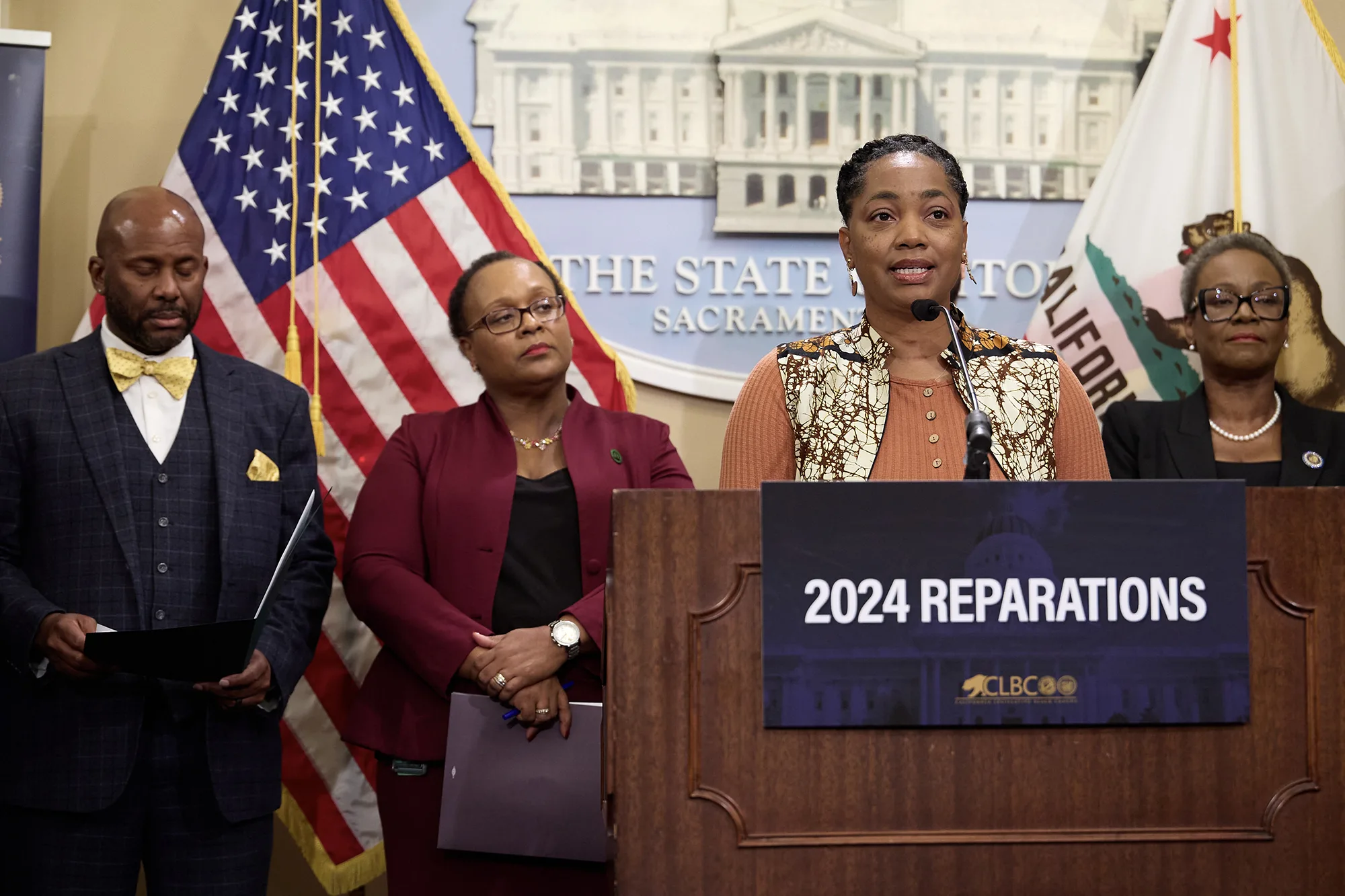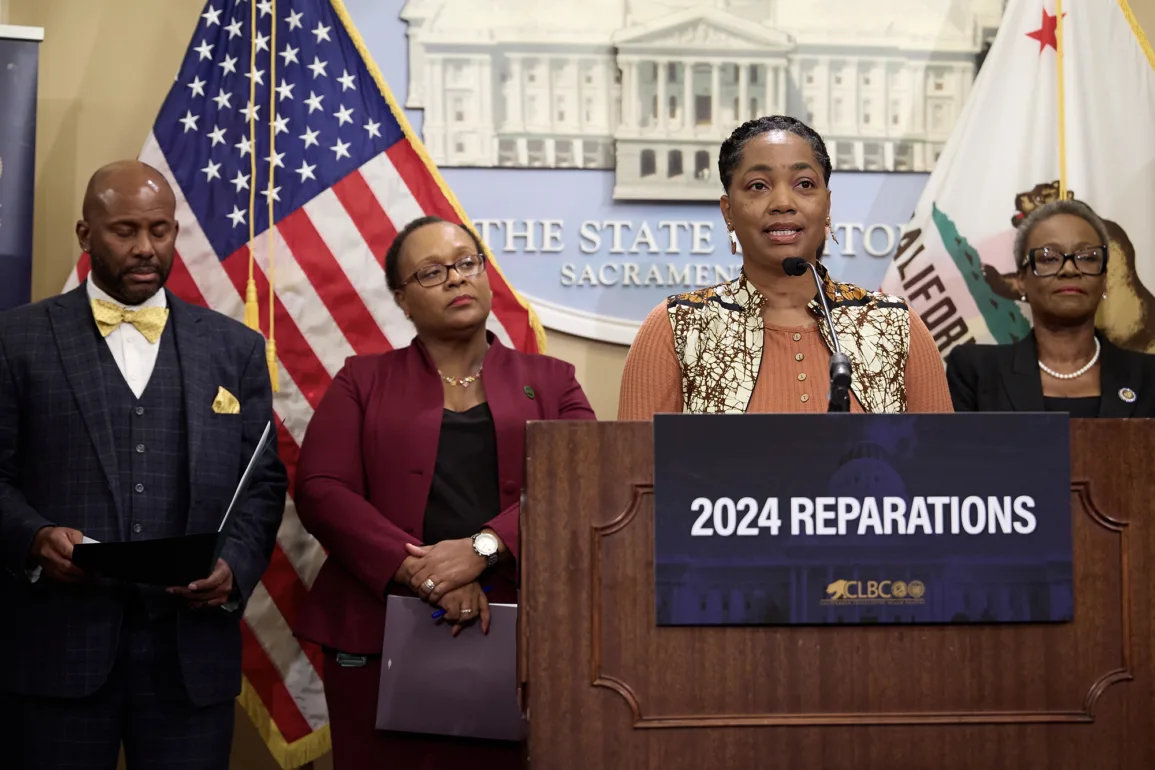Some of the public enthusiasm for racial justice has since waned. Meanwhile, key legislative deadlines are approaching in late April and early May. For bills to stay alive this session, they must pass their first chamber by May 24.
Some of Bradford’s proposed legislation would establish a new state agency called the California American Freedman Affairs Agency to administer reparations and help people research their ancestry.
Another of his bills would establish homeowners’ financial assistance to help descendants of enslaved people buy, insure and maintain their homes, and another would create a fund for reparations in the state budget.
His homeowners’ assistance bill passed the Senate’s Housing Committee last week, and his proposal to establish the Freedman Affairs Agency passed the Senate’s Judiciary Committee on Tuesday.
“You have to eat the elephant one bite at a time,” Bradford explained in an interview with CalMatters last week.
But Bradford, 64, who is in the last year of his final term, is taking a bigger bite of the elephant than his colleagues, advocates say.
“He is our hero right now,” Lodgson said. “Because if it weren’t for him, I don’t know, this would be very, very ugly.”
Black caucus priorities
Members of the California Legislative Black Caucus say their slate of bills is only the first step in a multiyear effort to right the wrongs of slavery and racism.
Wilson said the caucus considered about 26 bills based on the task force’s recommendations and voted on which ones to prioritize this year while “recognizing the budget environment we’re in.”

“We ended up coming up with 14 bills that everybody was ‘all in’ on,” Wilson said. For the other bills not in the slate, it “doesn’t mean it’s not a reparations bill. It doesn’t mean that members aren’t supporting it.”
She noted even she has a bill modeled after the task force’s recommendations that was not included in the coalition’s slate this year. That measure is aimed at reducing the disproportionate maternal mortality rate of Black women and was introduced with state Attorney General Rob Bonta.
The differing sets of proposed laws underscore a broader debate over the extent and form of restitution necessary to redress the historical wrongs. The United Nations defines reparations as including compensation. The task force made about 115 recommendations.
The Black Caucus’ reparations slate includes proposed laws that would limit solitary confinement in state prisons, provide property tax relief in redlined communities and prompt a formal apology from California and Newsom for the Golden State’s history of slavery and anti-Black racism.
“It’s almost insulting to call their bills reparations,” Lodgson said of the slate.
One of Bradford’s bills is included in the caucus package. That measure would create a database of California residents whose land was taken through the racially motivated use of eminent domain. The bill would be a first step in returning what was taken.
How to pay for California reparations
None of the bills — neither the caucus’ nor Bradford’s — includes the direct cash payments recommended by the task force. Not yet, Bradford said.
“I’m still not of the belief that we have come that far as a state, let alone a nation, to truly embrace and understand the obligation,” Bradford said.
He said the possibility of cash payments isn’t off the table. One of his bills aims to create a fund for reparations in the state budget.
“There’s not enough money in the state’s budget or in the national budget to make descendants of slavery whole in this country,” he said. If he had to start somewhere, though, he would begin with the wealth gap between average African Americans and whites, pegged at around $370,000.
Jones-Sawyer said one major hurdle to overcome is paying for the various reparations measures. He said his proposal would tax the same products that brought wealth to other races through slave labor — gold, cotton, tobacco, wine, olives, cane sugar, rice and coffee beans.
“A group of people gave free labor for 400 years. These commodities benefited greatly from that. We need to be able to figure out a way to excise money so that it can be brought back into the Black community,” he said. “It’s really a crawl back on the ill-gotten wealth that faceless and nameless individuals and corporations acquired from slave labor, who never earned a wage or benefited from their work.”
Recognizing the uphill battle lawmakers face, Bradford noted some Republicans won’t even vote in favor of acknowledging slavery existed.
Many Republicans did not cast a vote on the recently proposed resolution to “acknowledge the harms and atrocities committed by representatives of the State of California who promoted, facilitated, enforced, and permitted the institution of chattel slavery and the legacy of ongoing badges and incidents of slavery that form the systemic structures of discrimination.”
Assemblymember Diane Dixon, a Republican from Newport Beach, said even though California in its early days “enacted a number of laws that intentionally discriminated against African Americans,” she was abstaining from voting in favor or against the measure because “today, we can be proud that California, in the second half … of the 20th century became a national leader in extending civil rights to African Americans and others.”
Dixon, 72, made her comments when the proposed legislation was before the Assembly’s judiciary committee on Feb. 20, adding she looked forward to “growing our knowledge in reading the reparations report.”
Forced labor in California
Some of the proposed legislation in the caucus’ reparations package were bills that previously failed, such as the measure to remove an exemption in California’s constitution that allows for forced labor. Critics say requiring incarcerated people to work, often for low pay, is a form of slavery, but state officials say prison workers save the state tens of millions of dollars.
Bradford said he urges all lawmakers to read the task force’s report or at least the executive summary. Several lawmakers say more education and public outreach are needed before some reparations measures can become a reality.
“We spent two years of our lives on this,” Bradford said, adding it cost taxpayers nearly $1 million for the task force hearings, research and report.



